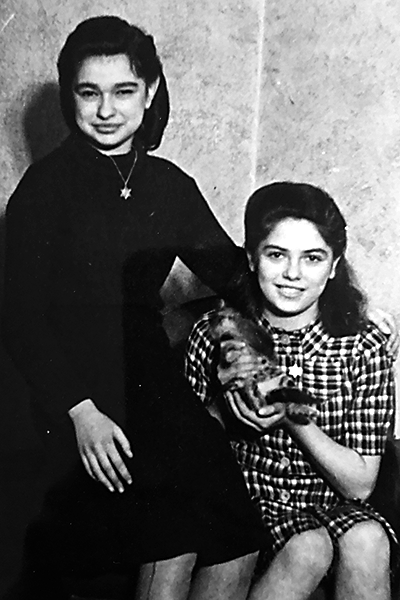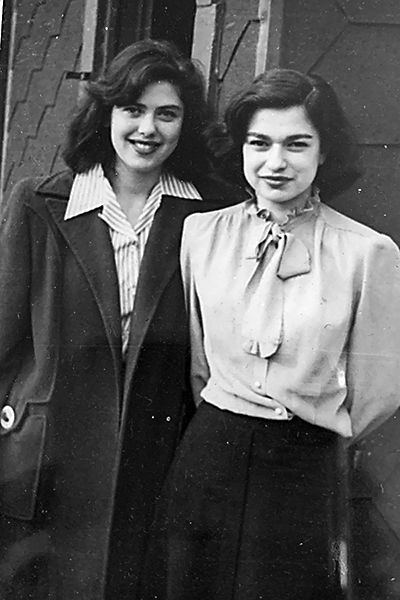 Holocaust Remembrance
Holocaust Remembrance

My name at birth was Chaya Scharfer. I was born on November 4, 1929 to Malke and Jacob Scharfer. I was born in the free state of Danzig, which is now Gdansk, Poland. I was the fifth child for my parents who eventually had eight children. My siblings were Sophie, Maurice, Annie, Mendel, Sura, Mira and Shulem. We were a very orthodox family.
My mother Malke Halle was born to a very religious family in Berlin, Germany in 1892. Malke’s parents, Bashe and Berish, lived with their eight children on Almstadt Strasse 25, in the Jewish Quarter, in Berlin-Mitte. They called it the yellow house. Berish was a butcher. Malke was exceptionally bright, charming and personable. She had excellent taste and an appreciation for fine things. She was a businesswoman ahead of her time and owned an army uniform clothing store in Berlin with her sister, Mirel.
My father Jacob Scharfer was born in 1895 in Stanieleu, in the Galitziana region of Poland and raised in Vienna. He was one of six children. He was very intelligent, quiet, kind, religious and extremely handsome. He was in the leather goods business in Vienna and moved to Berlin to attend a Jewish school, Adam Yisroel.
My parents met in Berlin and were married in 1918. My sister Sophie was born in Berlin in 1919. My Aunt Rosa (my dad’s sister) and her husband lived in Danzig and urged my parents to join them by moving there. Danzig was a beautiful port city on the Baltic Sea near the Polish Corridor, a six hour train ride from Berlin. Before WWI, Danzig was a small and prosperous city and part of Germany. In 1920, it was established as a free state, an independent city state under the protection of the League of Nations. Danzig was two- thirds the size of Rhode Island. The vast majority of the population of Danzig, including the Jews, wanted to retain their German citizenship. However, the League of Nations insisted they become citizens of the new city-state of Danzig, a decision that ultimately saved the lives of many of its Jews.
My parents moved to Danzig in 1920, and before long, owned and ran the largest kosher hotel on the Baltic Sea. The sixteen room Scharfer’s Hotel, located at 52 Pfeffer Straat, was known all over Eastern Europe. Jewish and non-Jewish merchants stayed at the hotel, mostly from Poland. My mother ran the hotel and restaurant. She was a fabulous cook and oversaw the kitchen and kitchen garden, which supplied vegetables and herbs for the restaurant. My father picked the guests up at the train station.
Agnes, a non-Jew who worked for my parents and came to be considered a member of the family, helped with the hotel and took care of my siblings and me. Agnes was a devout Nazi who adored and worshipped Adolf Hitler, yet she loved my family and was completely devoted to us, even though we were Jewish. Agnes had two brothers who were high- ranking officers in the S.S. Nazi party. Agnes, her brothers and my family all lived around the corner from the hotel in an apartment building owned by my family on Heilige Geeist Gasse, Holy Ghost Street.
My family grew along with the hotel’s success. Within five years, my parents were blessed with four children. After my sister Sophie’s birth in 1919, my brother Maurice was born in 1920, my sister Annie in 1922 and my brother Mendel in 1924. My parents waited five long years for another baby to enter their lives, so my arrival on November 4, 1929 was especially momentous, and it was no secret that I was Papa’s favorite. My sister, Sura, was born in 1931.
Our lives were good and prosperous. My parents were integrated into the Danzig community and were highly respected business owners. The mayor of Danzig was a long time friend of theirs. Education was of utmost importance and my siblings and me all attended public schools. My brothers also studied Torah and my sisters and me were taught piano and French. My siblings and me performed acts of charity, or tzedekah, and delivered home cooked kosher meals to Jewish prisoners in the Danzig jail on Shabbat.
In 1933, my sister, Mira, was born.
Hitler had come to power that year and everything changed in Germany. In Berlin, Jews were being arrested and murdered in the streets and Jewish homes were randomly searched and ransacked. The Nazis broke into my grandparent’s apartment in Berlin and cut my grandfather’s beard. At that point, they realized they were no longer safe in Berlin so, in the summer of 1933, my grandparents left everything behind in Berlin and moved to Danzig to live with my family. There were ten thousand Jews living in Danzig at the time and, although Danzig had elected the Nazi party by a majority in 1933, the Jews of Danzig still felt secure because of the League of Nations special status awarded to Danzig.
In 1934, however, the economic situation worsened and life changed for Danzig’s Jews. Jews were no longer permitted to attend school or to maintain their daily routines. Storefront windows of Jewish businesses, including my family’s hotel, were always broken. Jews were arrested, beaten in the streets and murdered on a daily basis. People no longer wanted to stay at my family’s hotel since it was a Jewish hotel. My parents were forced to close the hotel and tearfully had to let all of their employees go. Agnes, however, remained loyal to our family and insisted on staying even though there was no money to pay her.
In the midst of all this horror, my parents had another child in 1935. My brother Shulem was named from the Hebrew word for peace, shalom.
Conditions for Danzig’s Jews continued to worsen and one day Nazi officers stormed into the house looking for my father. Agnes, in her devotion to my father risked her life by hiding him in a bathtub covered with dirty laundry. The Nazis searched everywhere, but didn’t find him under the laundry. They left the house grumbling and frustrated. But they would be back.
Every ten days, my father’s name came up on the list of men to be arrested. Agnes’s brothers, high ranking Nazi officers, risked their lives and tipped Agnes off when they saw his name come up. Then he would go and hide in the cellar.
One time there was no warning. “Open up!”, shouted the Nazi officers. There was thunderous banging on the door. The Nazis were back to arrest my father. They broke into the house. My father was terror-stricken and wanted to jump from the window rather than be arrested. Again, Agnes risked her life to save him. She held him back and hid him in a closet; then ran to greet the Nazis. Agnes lied to the Nazi soldiers and told them that he had disappeared and no one knew what had happened to him. The Nazis recognized Agnes as a loyal member of the Nazi party, so they believed her and left grumbling and frustrated again.
By 1938, conditions were unbearable for the Jews still living in Danzig and it was clear that they had no choice but to leave. My grandparents, Bashe and Berish, emigrated to Palestine. Sophie was sent to live with an aunt and uncle in Brooklyn and Maurice followed in October of 1938. Annie joined Youth Aliyah and settled in Bat Yam, Palestine. Mendel was sent to study at a Yeshiva in Vilna, Lithuania and later fled to Japan along with the rabbis and other students from the Yeshiva.
On November 12, 1938, Kristallnacht, the Night of Broken Glass, took place in Danzig, three days after Kristallnacht in Germany. The future of the Jews in Germany and in Danzig was desperate.
The remaining members of my family were forced to go into hiding. My parents sold their real estate for less than it was worth to get money for food, covered the windows with black curtains and moved into the basement of the hotel. Agnes helped us survive. She brought food to us, although there was very little food to go around. Agnes eventually moved to Berlin, but loyally continued to send packages of food to us.
After Kristallnacht, the British Parliament relaxed its regulations for the immigration of Jewish refugee children. Between December, 1938 and September, 1939, Jewish agencies in Germany, Austria, Czechoslovakia, Poland and Danzig quickly organized groups of children to be sent by train to Great Britain via Holland, known as the Kindertransport, or children’s transport. Through this effort, 10,000 children were able to escape from Nazi Germany. One hundred and twenty four of the children were from Danzig. This was the only chance parents had to get their children away from the Nazi murderers to safety. They were well aware that they might never see their children again. In fact, eighty percent of them never did. It was heart wrenching.
On May 3, 1939, I was nine years old and my sister Sura was seven years old. On this day, my sister Sura and I were sent by ourselves on a Kindertransport from Danzig to England. We wore our Kindertransport name tags around our necks. My mother told me to never let go of my sister. At nine years old I become an adult.
Our first stop was in Berlin, at the Berlin Friedrichstrasse Station. My Aunt Sura met us there and gave us “big girl” leather pocketbooks. We then traveled on another train to Hoek van Holland, or Rotterdam, supervised to the Dutch-German border by the Gestapo. We stayed overnight there and Catholic nuns took care of us and gave us cookies and hot cocoa. From there we crossed the rough waters of the North Sea to Harwich and then continued by train to Liverpool Street Station in London.
When we first arrived in England we lived with an aunt and uncle in Leeds. However, we were mistreated by our uncle and were fortunate to be transferred to a hostel for refugee girls in Harrogate. The hostel was run by a Jewish Federation. We lived at the hostel until 1946.
On November 22, 1946, my sister Sura and I left England for the United States on the Queen Elizabeth. We arrived in NY Harbor on November 27, 1946. Both of our parents and all of our six siblings had already made it to New York and were living in Williamsburg, Brooklyn. My father and brother Maurice were waiting on the dock for us when we arrived. Before going home, Maurice took us to an elegant shoe store to buy us new shoes.
Once in New York, I lived with my parents in Williamsburg and worked in the office of my brother Maurice’s fur salon in New York. My family later moved to a house in Manhattan Beach, Brooklyn. I spent some time living in southern California with my sister, Sophie. When I returned to New York I worked as a nursery school teacher. I was introduced to my husband Jack Sherman and we married on January 26, 1956. We lived in Little Neck, Queens and had two daughters, Julie and Carla. In 1963 we moved to Woodbury, Long Island. We were married for fifty years, have two wonderful son-in-laws, Bruce Jakubovitz and Martin Ehrlich, and five beautiful grandchildren, Jordan, Aaron, Rachel, Daniel and Lauren, and one great grandchild, Sadie.

Malke and Jacob Scharfer

Chaya and Sura

Survivor Helen Sherman, second from left with three younger siblings and governess Agnes

Chaya and Sura arriving on Kindertransport

Chaya

Helen Sherman with sister Sura in England, around 1945

Helen Sherman and sister Sura in the U.S

Helen

Helen and Jack

Mendel, Shulem, Maurice, Annie, Mira, Helen, Sara, and Sophie

Helen, Julie, Carla

Helen with the Grandkids